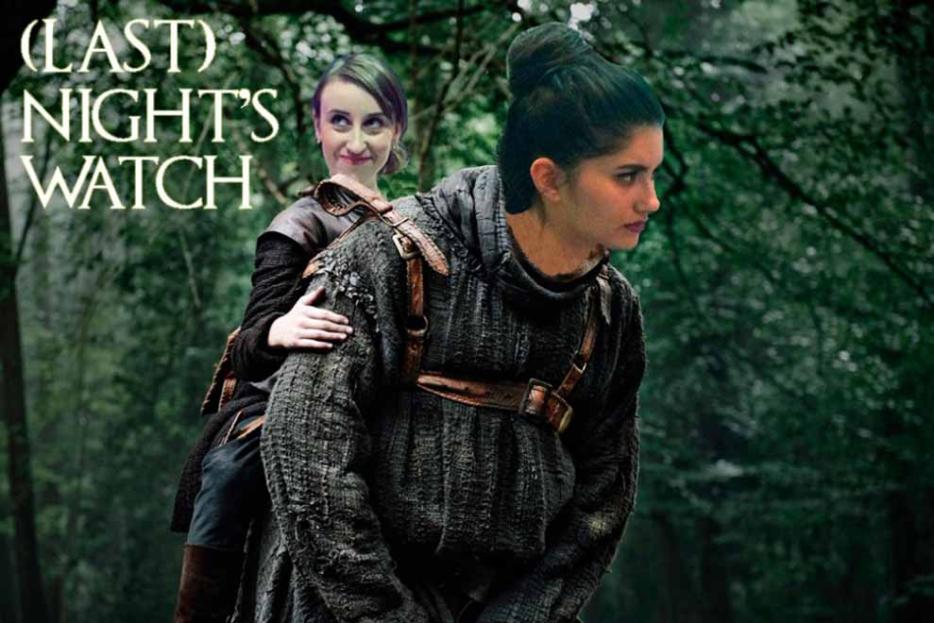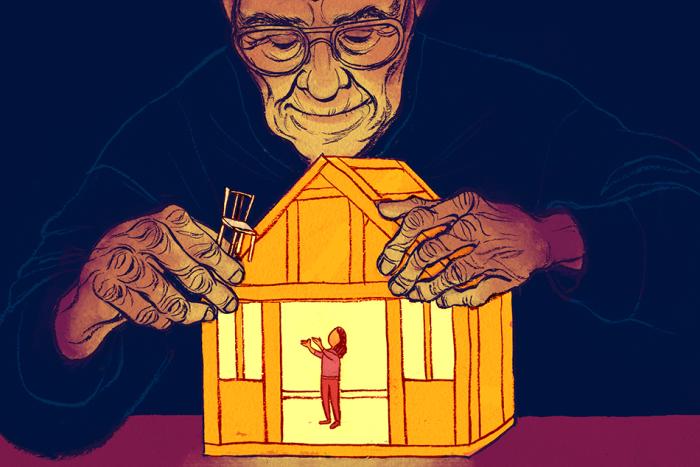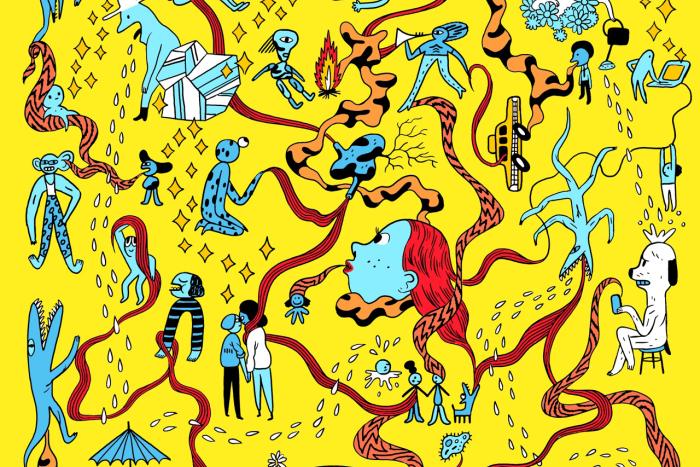Scaachi: The undercurrent of sexual violence against women in this show is so hard to watch sometimes, I don’t know how so many people have done it for so long.
Also good afternoon, Haley, how are you.
Haley: Good afternoon, Scaach. Yes, it’s pretty horrifying. And I’m finding especially so with this new puritanical element introduced by the High Sparrow. The combination of policing and punishing makes it even more disturbing for me.
Scaachi: At least it was merciful that the show did not let Big Sam’s wife (wife?) get raped but it was not exactly a comforting conclusion. Wolf? What? At least Jon Snow is gone to (please god please) be murdered somewhere in the woods.
Haley: Gilly was, until this episode, a woman Sam had befriended and saved. Despite the romantic undertones of their relationship, nothing had happened between them until now. The wolf is actually a Direwolf, which is like a giant prehistoric-seeming vulpine companion. Each of the Stark children had a Direwolf pup given to them in the first season. This is Ghost, Jon Snow’s.
Scaachi: Man, Sam is always getting overshadowed by Jon Snow and his BAD HAIR.
Haley: Sam has had his heroic moments!
Scaachi: Oh, of course, I’m not saying he isn’t noble. Frankly, I’d appreciate some more fanfare for him than Dumb Jon. But I am growing pretty tired of how this show treats women and I can’t tell if it’s me being sensitive or if it’s real. Last week, we didn’t talk about the Sansa/Ramsay rape scene but it’s been bothering me ever since. Combine that with the Snake Ladies, and it seems like most of the female characters in this show have one very specific thing to offer. Not that they aren’t complex characters, just that it sometimes get reduced to ... well, you know.
Haley: I think that scene in the jail was a perfect example of how Game of Thrones fucks up its portrayal of women. In the books, Dornish society is a very openly sexual one, and women are allowed just as much sexual agency and enjoyment as men. But instead of portraying that in a powerful way, we see a woman asking for a man’s approval before she’ll save his life. Even if that scene was supposed to be tongue-in-cheek (perhaps it would be giving the show too much credit, but there is a read here that it was supposed to suggest just how little Bronn’s approval means to Tyene), I don’t think it would be interpreted that way by most viewers, which is just bad writing. It’s almost comically bad, and it speaks to the need for more female representation in writing rooms. The writers credited for this episode are all men. Can’t you just see a bunch of men writing that scene and patting themselves on the back for how “strong” Tyene sounds? It just seems like ignorance.
Scaachi: That is the thing, isn’t it? That so many of these scenes with “strong” female characters are written like prototypes of “strong” female characters. It’s like this mould someone made for How To Write A Woman With Balls and then they just do that over and over with different hair and boob shapes. God, the boob shapes, Haley, it’s endless. And I wonder what’s going on in the writers’ room when they add a rape scene that didn’t exist in the book, or existed in a different context. Do you think the thought process is, “This will show more character, more dynamism, will force this character to fight and people like seeing people get knocked down and then built up”? I don’t know.
Haley: Many of the objections to the scene in which Ramsay rapes Sansa stem from the feeling that the scene didn’t tell us anything we didn’t already know (Theon/Reek is powerless, Ramsay is despicable, Sansa is trapped and in danger), and so it was written for shock and not narrative value. It’s obviously impossible to know what the intentions of the writers are, and whether they are guilty of ignorance and insensitivity or something more deliberate. For me, the shifting of Daenerys’ first-season wedding night from consensual sex to rape was infuriating and almost narratively illogical.
When trying to parse the intentions of the writers, it could perhaps be illuminating to consider their response to a scene last season featuring Jaime and Cersei that is consensual in the books but was considered by many viewers to have been re-written as a rape scene in the show. The show’s official response was to say that people were misinterpreting the scene in the show, and that it was meant to read as consensual. So, either they’re talking their way out of something, or there’s a lack of awareness among members of the production team about the complexity and responsibility inherent in portraying rape and sexual assault on television, or even just sex in general. Where is the ethical place between exploitation/sensationalism and censorship/denial? I do not know. Do concepts of censorship or denial even apply to a fictional universe, in which “reality” is a construct?
Scaachi: You know, Reek betraying her (again?) felt more emotionally gutting than the actual scene itself. This show does a lot of things well but subtlety is not a strong suit. (But I also can’t figure out if it’s better to not show it at all, because it’s not like rape isn’t a thing. I would rather it be discussed publicly. But I’ve never figured out what would be the right way to do that.)
Haley: I agree, it’s so complicated. But, in this episode, Reek’s betrayal is illustrated in a way that doesn’t involve a rape scene. So, I can understand why many people argued that the scene from the previous episode didn’t feel like a narrative necessity.
Scaachi: Well, just the way Ramsay kisses her is so charged with tension and abusive undertones that it’s not necessary to make us hear her scream. I get that rape can be a plot device and can sometimes be very effective or even needed, but was it needed in this case? Because I do think it’s a very different thing than when someone gets beheaded in this show: it’s humiliating and demeaning and a power grab and a clear attempt to break someone down to their most basic elements. It’s bigger than I think a lot of people can grasp.
But again—maybe I’m being sensitive about a show that is, ultimately, fiction and set in an entirely different world?
Haley: I don’t think you’re being sensitive—it’s ultimately a judgment call and many feel that the writers showed poor judgment. There’s an inherent responsibility, I think, when portraying horrific events on television. If you choose to go there, you need to be able to show your audience the full range of consequences. Too often, rape on television is used as a device to illustrate a change in a male character, and screen time is rarely given to the horrific impact it has on the victim, male or female. I think that’s also true of violence in general in Game of Thrones, not just violence against women or sexual violence, but I think as with anything, people reach a point where their tolerance has been tested too often, and they no longer believe in the integrity of the people telling the story.
Scaachi: Obviously hard to parse. And no “right answer” either, which is probably why people have been talking about it for such a long time.
And not to make too jarring a left turn, BUT CAN WE TALK ABOUT THE QUEEN.
Haley: And dialogue is good, so do scenes like this then serve a purpose? Hard to say. Anyway, yes, Cersei. Cersei is in jail now. Is that the queen you’re talking about?
Scaachi: Yes! Why do I have so much sympathy for her??? She is a monster, right?
Haley: No, I sympathize with her too. She’s done some monstrous things, but she’s also had a monstrous life.
Scaachi: I think I need some explanation of this religious fervour that’s sweeping the area and what the hell she is doing in jail.
Haley: Certainly! So, her plan to wield the puritanical, bigoted mania of this religious sect to her advantage has failed, because Lancel, her cousin with whom she had an affair, has joined the sect and told them about his relationship with her (and possibly substantiated the rumours about her incestuous relationship with her brother and the subsequent parentage of her children, including the king).
Scaachi: But I thought he was still all boned up for her?
Haley: Lancel? Not that I know of, but maybe I missed something. I thought he’d bought into this Sparrow business wholesale. Although perhaps that’s what the High Sparrow was referring to when he talked about the process of Lancel becoming one of them?
Scaachi: Is the High Sparrow bad? I thought he was good but this flagrant homophobia is not cute.
Haley: Yeah, he’s no good.
Scaachi: Boy, this conversation is a real downer. I ruin everything.
Haley: No, Game of Thrones is just generally depressing. In both the narrative and analytical context.
Scaachi: I’m going to go cleanse my palate with some ol’ Teen Mom.
Haley: Do what you’ve gotta do.







